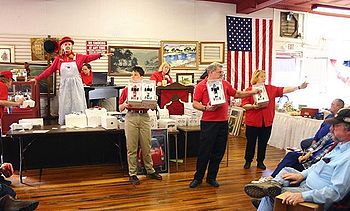Portal:Business and economics
The Business and Economics Portal Business is the practice of making one's living or making money by producing or buying and selling products (such as goods and services). It is also "any activity or enterprise entered into for profit." A business entity is not necessarily separate from the owner and the creditors can hold the owner liable for debts the business has acquired. The taxation system for businesses is different from that of the corporates. A business structure does not allow for corporate tax rates. The proprietor is personally taxed on all income from the business. A distinction is made in law and public offices between the term business and a company such as a corporation or cooperative. Colloquially, the terms are used interchangeably. (Full article...) Economics (/ˌɛkəˈnɒmɪks, ˌiːkə-/) is a social science that studies the production, distribution, and consumption of goods and services. Economics focuses on the behaviour and interactions of economic agents and how economies work. Microeconomics analyses what is viewed as basic elements within economies, including individual agents and markets, their interactions, and the outcomes of interactions. Individual agents may include, for example, households, firms, buyers, and sellers. Macroeconomics analyses economies as systems where production, distribution, consumption, savings, and investment expenditure interact, and factors affecting it: factors of production, such as labour, capital, land, and enterprise, inflation, economic growth, and public policies that have impact on these elements. It also seeks to analyse and describe the global economy. (Full article...) Selected articleDuring the Khrushchev era, from 1956 through 1962, the Soviet Union attempted to implement major wage reforms intended to move Soviet industrial workers away from the mindset of overfulfilling quotas that had characterised the Soviet economy during the preceding Stalinist period and toward a more efficient financial incentive. Throughout the Stalinist period, most Soviet workers had been paid for their work based on a piece-rate system. Thus their individual wages were directly tied to the amount of work they produced. This policy was intended to encourage workers to toil and therefore increase production as much as possible. The piece-rate system led to the growth of bureaucracy and contributed to significant inefficiencies in Soviet industry. In addition, factory managers frequently manipulated the personal production quotas given to workers to prevent workers' wages from falling too low. Selected image
Selected economyThe economy of Iraq is dominated by the oil sector, which provided 89% of foreign exchange earnings in 2024. During its modern history, the oil sector has provided about 99.7% of foreign exchange earnings. Iraq's hitherto agrarian economy underwent rapid development following the 14 July Revolution in 1958 which overthrew the Hashemite Iraqi monarchy. It had become the third-largest economy in the Middle East by 1980. This occurred in part because of the government's successful industrialization and infrastructure development initiatives led by Saddam Hussein in the 1970s, which included irrigation projects, railway and highway construction, and rural electrification. (Full article...) Selected quote"Have you ever witnessed the anger of the good shopkeeper, James B., when his careless son happened to break a square of glass? If you have been present at such a scene, you will most assuredly bear witness to the fact, that every one of the spectators, were there even thirty of them, by common consent apparently, offered the unfortunate owner this invariable consolation—"It is an ill wind that blows nobody good. Everybody must live, and what would become of the glaziers if panes of glass were never broken?" Now, this form of condolence contains an entire theory, which it will be well to show up in this simple case, seeing that it is precisely the same as that which, unhappily, regulates the greater part of our economical institutions. Suppose it cost six francs to repair the damage, and you say that the accident brings six francs to the glazier's trade—that it encourages that trade to the amount of six francs—I grant it; I have not a word to say against it; you reason justly. The glazier comes, performs his task, receives his six francs, rubs his hands, and, in his heart, blesses the careless child. All this is that which is seen. But if, on the other hand, you come to the conclusion, as is too often the case, that it is a good thing to break windows, that it causes money to circulate, and that the encouragement of industry in general will be the result of it, you will oblige me to call out, "Stop there! your theory is confined to that which is seen; it takes no account of that which is not seen." It is not seen that as our shopkeeper has spent six francs upon one thing, he cannot spend them upon another. It is not seen that if he had not had a window to replace, he would, perhaps, have replaced his old shoes, or added another book to his library. In short, he would have employed his six francs in some way, which this accident has prevented."
TopicsRelated WikiProjectsDid you know (auto-generated) -
On this day in business history
General imagesThe following are images from various business-related articles on Wikipedia.
More did you know
Business news
Subcategories
Related portals
Things you can doUrgent and important articles are bold
WikimediaThe following Wikimedia Foundation sister projects provide more on this subject:
SourcesDiscover Wikipedia using portals |






































